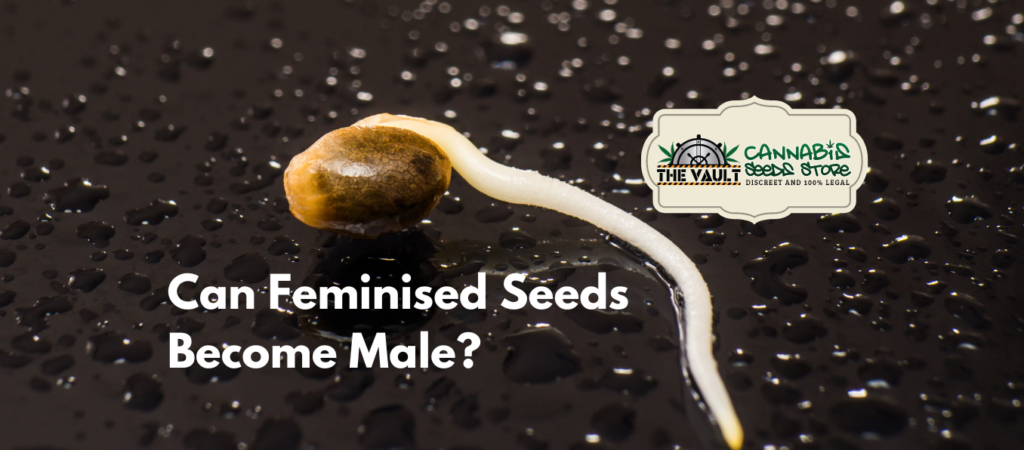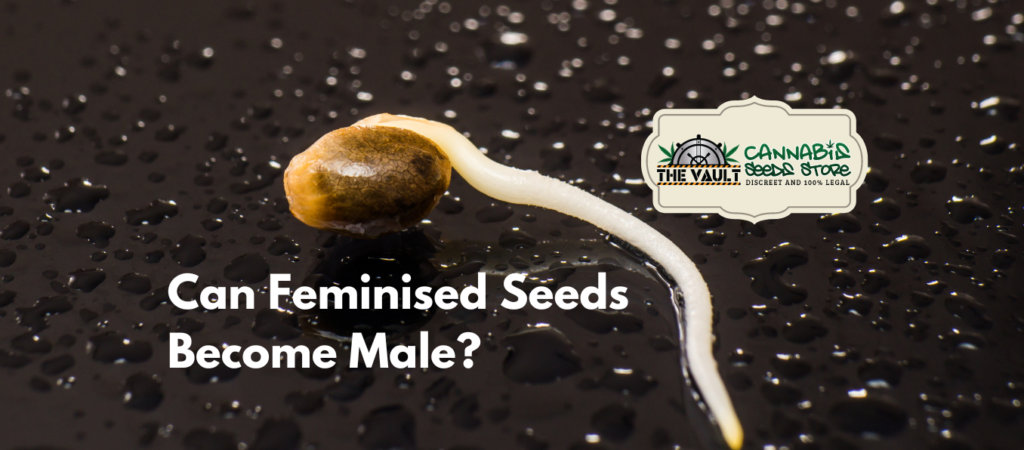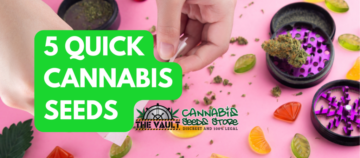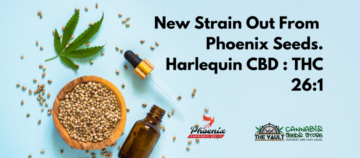
Can Feminized Cannabis Seeds Become Male?
In the world of cannabis cultivation, feminized seeds have revolutionized the way growers approach their craft. These seeds are engineered to produce only female plants, which are prized for their resinous buds rich in cannabinoids like THC and CBD. However, amidst the excitement of cultivating all-female crops, a pertinent question often arises: Can feminized seeds become male? In this post, we’ll delve into the science behind feminized seeds, explore the factors influencing their stability, and discuss the rare instances when feminized seeds may exhibit male traits.
Understanding Feminized Cannabis Seeds
To comprehend the dynamics of feminized seeds, it’s essential to understand the natural reproductive biology of cannabis plants. Cannabis is a dioecious plant species, meaning it typically produces male and female flowers on separate plants. Female plants are sought after in cultivation for their flower clusters, while male plants are primarily used for breeding purposes to facilitate seed production.
Feminized seeds are created through a process of inducing hermaphroditism in female plants. This involves stressing a selected female plant to produce male flowers containing pollen. The resulting pollen is then used to fertilize another female plant, leading to the development of seeds that are almost always genetically female. This technique has become increasingly popular among growers due to its efficiency in eliminating the risk of male plants, which do not produce the desired flower buds and can pollinate female plants, leading to seed production rather than bud development.
Factors Influencing Seed Stability
While feminized seeds are designed to produce female plants, their stability can be influenced by various factors throughout the breeding and cultivation process. One crucial factor is the expertise of the breeder and the quality of the breeding techniques employed. Reputable breeders utilize rigorous selection processes and advanced breeding methods to ensure the reliability and stability of their feminized seeds.
Additionally, environmental factors during cultivation can impact the expression of male traits in feminized plants. Stressors such as temperature fluctuations, nutrient deficiencies, pests, diseases, and physical damage can trigger a plant’s natural defense mechanisms, potentially leading to the development of male flowers. Therefore, maintaining optimal growing conditions and implementing proper stress management techniques are essential for maximizing the stability of feminized seeds.
Occurrence of Male Traits in Feminized Seeds
While feminized seeds are designed to produce female plants, there are rare instances where they may exhibit male traits. This phenomenon, known as hermaphroditism or “herming,” occurs when a plant undergoes stress or genetic instability, causing it to develop both male and female reproductive organs.
There are two main types of hermaphroditism: genetic hermaphroditism and environmental hermaphroditism. Genetic hermaphroditism occurs when a plant inherits traits that predispose it to produce both male and female flowers, even under optimal growing conditions. This genetic instability can sometimes be present in feminized seeds, leading to a small percentage of plants exhibiting male characteristics.
On the other hand, environmental hermaphroditism occurs due to external stressors during the plant’s growth cycle. High levels of stress, such as intense light exposure, nutrient imbalances, water stress, or physical damage, can disrupt the plant’s hormone balance and trigger the development of male flowers as a survival mechanism.
Mitigating the Risk of Hermaphroditism
While the occurrence of male traits in feminized plants is rare, growers can take several precautions to mitigate the risk of hermaphroditism and ensure a successful harvest of female flowers:
1. Genetic Selection: Choose feminized seeds from reputable breeders known for their quality genetics and stable breeding techniques.
2. Optimal Growing Conditions: Maintain consistent environmental conditions, including proper lighting, temperature, humidity, and nutrient levels, to minimize stress on the plants.
3. Vigilant Monitoring: Regularly inspect plants for any signs of stress, disease, or pests, and promptly address any issues to prevent them from escalating.
4. Isolation: If growing feminized plants alongside regular or autoflowering varieties, ensure proper isolation to prevent accidental pollination and seed production.
5. Early Detection and Removal: Immediately remove any male flowers or hermaphroditic traits as soon as they are detected to prevent pollination and seed development.
By following these guidelines and staying attentive to the needs of their plants, growers can greatly reduce the likelihood of encountering male traits in feminized crops and enjoy the benefits of high-quality, all-female harvests.
Conclusion
In conclusion, while feminized seeds are engineered to produce female plants with high precision, the occurrence of male traits is theoretically possible but rare. Understanding the factors influencing seed stability and implementing proper cultivation practices are essential for minimizing the risk of hermaphroditism and ensuring a successful harvest of resinous, cannabinoid-rich flower buds. By staying informed and proactive, growers can harness the potential of feminized seeds to cultivate thriving cannabis crops while navigating the complexities of plant biology and genetics responsibly and ethically.
Browse our Cannabis Seed selection.
Newsletter Sign Up
Make sure you never miss another Vault promo – sign up for our newsletter !
Remember: It is illegal to germinate cannabis seeds in many countries including the UK. It is our duty to inform you of this fact and to urge you to obey all of your local laws to the letter. The Vault only ever sells or sends out seeds for souvenir, collection or novelty purposes.
- SEO Powered Content & PR Distribution. Get Amplified Today.
- PlatoData.Network Vertical Generative Ai. Empower Yourself. Access Here.
- PlatoAiStream. Web3 Intelligence. Knowledge Amplified. Access Here.
- PlatoESG. Carbon, CleanTech, Energy, Environment, Solar, Waste Management. Access Here.
- PlatoHealth. Biotech and Clinical Trials Intelligence. Access Here.
- Source: https://www.cannabis-seeds-store.co.uk/Cannabis-Seeds-News/can-feminised-seeds-become-male
- :has
- :is
- :not
- :where
- $UP
- 80
- a
- accidental
- address
- advanced
- After
- All
- almost
- alongside
- also
- always
- am
- amidst
- among
- an
- and
- Another
- any
- approach
- ARE
- arises
- AS
- At
- avatar
- aware
- Balance
- BE
- become
- behind
- being
- benefits
- biology
- both
- business
- but
- by
- CAN
- cannabis
- causing
- cbd
- characteristics
- Choose
- CO
- collection
- comes
- complexities
- comprehend
- conclusion
- conditions
- consistent
- containing
- countries
- craft
- created
- crops
- crucial
- Cultivate
- cultivation
- Customers
- cycle
- damage
- Defense
- deficiencies
- delve
- designed
- desired
- detected
- Detection
- develop
- Development
- Discount
- discuss
- Disease
- diseases
- Disrupt
- do
- due
- during
- dynamics
- Early
- efficiency
- eliminating
- employed
- encountering
- engineered
- enjoy
- ensure
- ensuring
- environmental
- escalating
- essential
- Ether (ETH)
- Even
- EVER
- Excitement
- exhibit
- Exhibiting
- expertise
- explore
- Exposure
- expression
- external
- eye
- facilitate
- fact
- factor
- factors
- female
- flower
- fluctuations
- following
- For
- from
- Gary
- genetic
- Genetics
- greatly
- growers
- Growing
- Growth
- guidelines
- hand
- happy
- harness
- harvest
- hashtag
- Have
- High
- high-quality
- However
- HTTPS
- i
- if
- Illegal
- immediately
- Impact
- implementing
- in
- Including
- increasingly
- influenced
- influencing
- inform
- informed
- instability
- instances
- intense
- into
- involves
- isolation
- issues
- IT
- ITS
- Keep
- known
- Laws
- leading
- letter
- levels
- light
- Lighting
- like
- likelihood
- local
- love
- Main
- maintain
- maintaining
- make
- male
- management
- many
- max-width
- maximizing
- May..
- meaning
- mechanism
- mechanisms
- Media
- methods
- minimize
- minimizing
- miss
- Mitigate
- monitoring
- Natural
- navigating
- needs
- never
- Newsletter
- novelty
- occurrence
- of
- often
- on
- ONE
- only
- optimal
- or
- Other
- our
- out
- partial
- percentage
- phenomenon
- photo
- physical
- plant
- plants
- plato
- Plato Data Intelligence
- PlatoData
- Pollen
- Popular
- possible
- Post
- potential
- potentially
- practices
- Precision
- present
- prevent
- primarily
- prized
- Proactive
- process
- processes
- produce
- produces
- Product
- Production
- Promo
- promptly
- proper
- purposes
- quality
- question
- range
- RARE
- rather
- reduce
- regular
- regularly
- reliability
- removal
- remove
- reputable
- responsibly
- resulting
- revolutionized
- Rich
- rigorous
- Risk
- s
- same
- Science
- seed
- seeds
- selected
- selection
- Sells
- sends
- separate
- several
- side
- sign
- Signs
- small
- So
- Social
- social media
- sometimes
- Soon
- sought
- Stability
- stable
- staying
- stress
- successful
- such
- sure
- survival
- Take
- technique
- techniques
- than
- that
- THC
- The
- the UK
- The Vault
- the world
- their
- Them
- then
- theoretically
- There.
- therefore
- These
- they
- this
- thriving
- Through
- throughout
- time
- to
- Tracking
- trigger
- two
- types
- typically
- Uk
- under
- undergoes
- understand
- understanding
- us
- used
- utilize
- various
- Vault
- Water
- Way..
- when
- which
- while
- with
- world
- worth
- you
- Your
- zephyrnet










